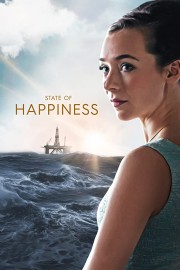State of Happiness (TV)
The miniseries, “State of Happiness” (known as “Lykkeland” in its native Norway, and available on the streaming service Topic), is about the moment when oil was discovered off of Norway’s shores in 1969, and what that meant for a community afterwards. It starts off slow, but, by the third episode, the emotional narratives and plot mechanics are moving in the same direction, and we are fully engaged by what we are watching.
“State of Happiness” centers around a handful of characters, and in particular, the Nyman family, one of the more successful ones in the city of Stavanger, Norway, where oil has been found on its shores, and it spends the series transforming the city, and its inhabitants, as business interests and politics get in the way. Fredrik Nyman (Per Kjerstad) has long been part of the business elite in Norway, but canning has struggled as company’s have come in looking for oil. Still, he, his wife (Pia Tjelta), and their son, Christian (Amund Harboe) are reasonably well off compared to people like Anna (Anne Regine Ellingsæter), Christian’s fiancee, who comes from a farming family, and Toril (Malene Wadel), whose family is about to be rattled through an unplanned pregnancy, and an accident that brings her into Christian’s orbit, and her father dying tragically. Throughout the eight episodes, we will see as all of these characters affect each other’s lives, and how the circumstances in Norway change them as the country forges an identity for itself as a oil country.
The film is rooted in realities of this time period in Norway’s history, but the teleplays for each episode by Mette M. Bølstad, Synnøve Hørsdal and Siv Rajendram Eliassen feel more like soap operas than docudrama. This was produced in 2018, but I cannot help but feel like an approach akin to last year’s “Chernobyl,” which stuck more to dramatizing the facts than telling a manufactured narrative, would have worked better. My mileage with each episode kind of rose and fell with how much the narrative dealt with the larger story of the business and politics of the oil industry vs. the melodrama of the character stories. That isn’t to say the characters are uninteresting, however; when the emotional narratives seem to come in direct contact with the oil industry- like Anna working for the Norwegian oil office, and how that puts her in close proximity to one of the oil company lawyers (Bart Edwards), and how that puts her in a complicated position with Christian and his family, or Christian trying to find some direction and building a diving business for himself after a tragedy on a rig- the series really feels focused, and we get engaged. And I will say that Toril, though she doesn’t have much to do with the larger story being told, has an interesting story, as well; her story of trying to survive on her own with as a single mother has some impact on the characters in the larger narrative, but ultimately, it is its own thing for the most part- it’s a compelling story that doesn’t really feel like it should be in this series, though it does play into the theme of finding your own happiness that Christian, Anna and Jonathan Kay (Edwards’s character) all find themselves facing by the end of the series. When that last episode ends, every life is changed, and how they define happiness is what helps define them. Even if it sometimes feels as though it takes the long way to get there, it ultimately lands that punch, both for the characters, and the nation they help populate.










